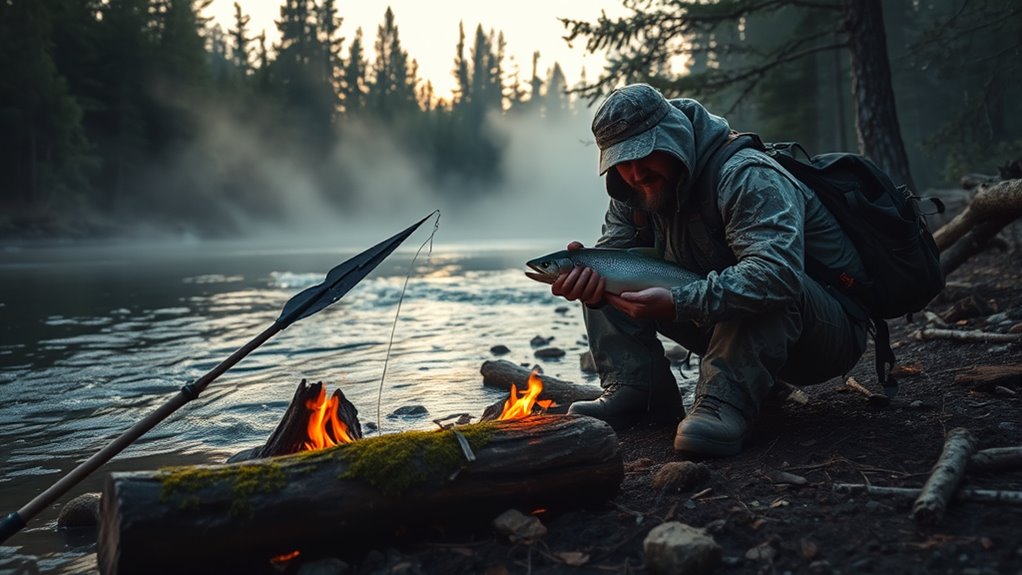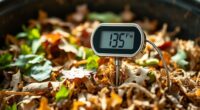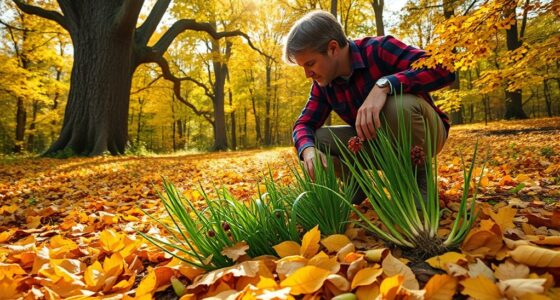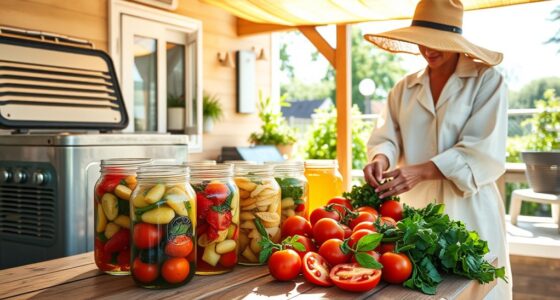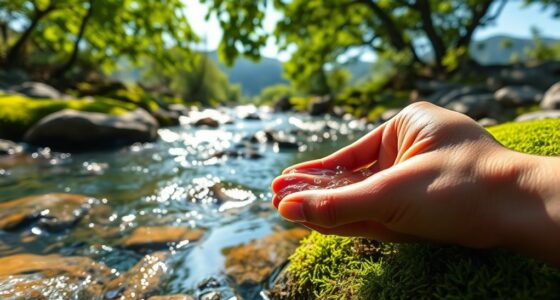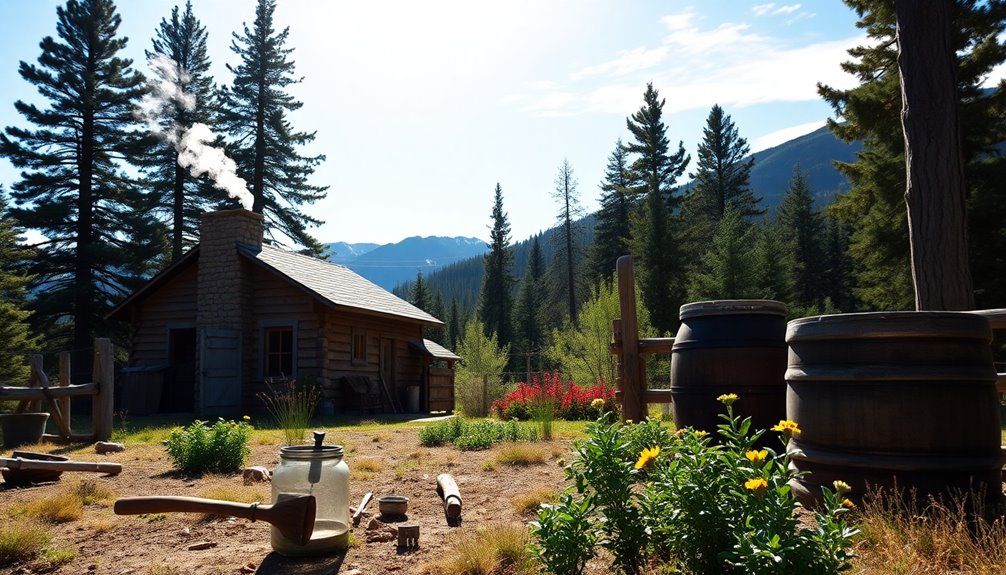To secure survival food, you should learn effective hunting and fishing techniques. Quickly process animals to maximize meat and minimize waste, using tools like knives and fire-starting kits. Practice fishing with natural baits and adaptive strategies, and preserve your catch through smoking or drying to extend its usability. Combining both skills boosts your self-sufficiency in tough situations. Keep honing these abilities, and you’ll discover even more ways to guarantee your food supply when it matters most.
Key Takeaways
- Master quick animal processing techniques to maximize meat safety and usability while minimizing waste.
- Utilize various preservation methods like smoking and drying to extend the shelf life of hunted and caught food.
- Learn effective freshwater fishing strategies, including bait selection and water reading, for consistent food supply.
- Adapt hunting and fishing techniques to different environments, improving efficiency and success rate.
- Combine hunting and fishing skills to diversify food sources and enhance self-sufficiency in survival situations.
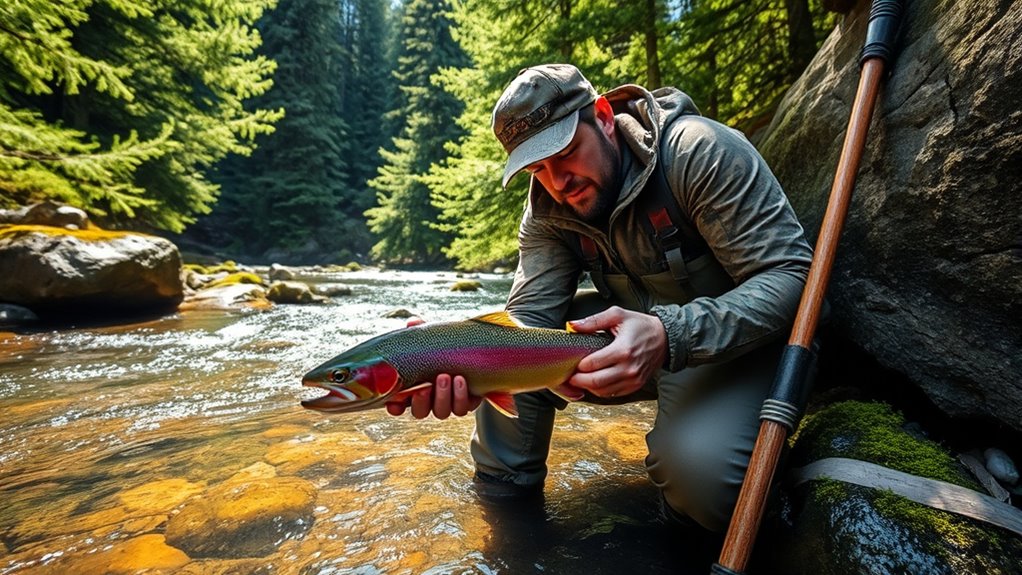
When disaster strikes or supplies run low, hunting and fishing become vital skills for securing survival food. Knowing how to hunt properly and fish effectively can make the difference between going hungry and staying alive. One of the first skills you need to develop is wild game preparation. After you’ve successfully hunted an animal, you must be able to process it quickly and efficiently. This includes skinning, cleaning, and butchering the animal to maximize usable meat and minimize waste. You’ll want to learn how to make use of every part to guarantee nothing goes to waste. Carrying a basic kit with a sharp knife, fire-starting tools, and containers for storing your catch or meat will streamline this process. Proper wild game preparation is essential because it guarantees your meat stays safe to eat and retains its nutritional value over time, especially if you’re in a prolonged survival situation. Additionally, understanding wild game processing techniques can help you avoid contamination and spoilage, ensuring your food remains safe for consumption. Developing skills in food preservation methods can further extend the usability of your catch and provide a valuable food reserve. Practicing efficient cleaning and preservation techniques can also help prevent waste and spoilage, which is especially crucial when resources are scarce.
On the fishing front, freshwater fishing techniques are key to securing a consistent food source. You should familiarize yourself with the types of bait that work best for local fish and learn how to cast accurately, whether you’re using a simple rod and line or more advanced methods like trap fishing or hand lines. Knowing how to read the water—spotting fish activity, understanding current flow, and identifying promising spots—can considerably increase your catch rate. Using natural bait like worms, insects, or small fish can lure in a variety of freshwater species. Additionally, selecting the right fishing gear suited for survival situations, such as durable lines and multi-purpose rods, guarantees you’re prepared for different conditions. It’s also wise to practice different freshwater fishing techniques, such as trolling, still fishing, or setting traps, to adapt to changing circumstances or different water bodies. Developing your fishing skills can greatly improve your efficiency and success rate in securing food.
Combining your skills in wild game preparation with effective freshwater fishing techniques allows you to diversify your food sources. When hunting, focus on quick, humane kills and proper processing, so you preserve as much meat as possible. When fishing, aim for steady catches and learn how to preserve your catch by smoking, drying, or storing it in cool conditions if possible. The more versatile your skills, the better you’ll be at sustaining yourself in challenging environments. Remember, patience and practice are indispensable—your ability to adapt and refine your techniques will greatly improve your chances of survival. Mastering these skills not only boosts your confidence but also guarantees you’re better prepared to face whatever challenges come your way.
Frequently Asked Questions
What Legal Permits Are Required for Hunting and Fishing in Survival Situations?
When considering hunting and fishing, it’s essential to follow hunting ethics and respect fishing regulations, even in survival situations. You usually need permits or licenses, depending on your location, to guarantee legal compliance. While emergencies might allow some flexibility, it’s best to stay informed about local laws. Always prioritize ethical hunting and fishing practices to preserve resources and avoid legal trouble, especially when survival depends on your actions.
How Do I Identify Edible Versus Poisonous Wild Plants?
Think of edible plants as hidden treasures in a dense forest. You need sharp eyes and careful techniques to find them safely. Use identification techniques like examining leaf shape, smell, and color. Watch out for plant toxicity signs such as bitter taste or milky sap. Always cross-reference with reliable guides or apps, and avoid plants with suspicious features. Remember, a small mistake can turn a meal into a danger.
What Are the Best Tools for Silent Hunting and Fishing?
To master silent hunting and fishing, you need the right tools and stealth techniques. Use silent weapons like a bow and arrow or a slingshot to avoid noise. Equip yourself with camouflage gear to blend into your environment and move slowly to minimize sounds. Silent fishing tools, such as a fishing spear or hand lines, help you catch fish quietly. Practice your stealth techniques regularly to improve your chances of success without alerting prey.
How Can I Preserve and Store Survival Catches Effectively?
To preserve and store your survival catches effectively, you should use drying techniques like air drying or solar drying to remove moisture. Smoking methods, such as cold smoking or hot smoking, also work well by adding flavor and preventing spoilage. Store the dried or smoked food in airtight containers or vacuum-sealed bags in a cool, dark place. Proper preservation guarantees your catches last longer and stay safe to eat.
What Safety Precautions Should I Take When Handling Wild Game?
Handling wild game is like walking a tightrope—you need to stay alert. Always use a sharp knife to reduce slips, and keep your fingers clear of the blade. Wear gloves to avoid contamination and wash everything thoroughly afterward. Be cautious of hidden bones or sharp edges that could cause injury. By practicing knife safety and careful wild game handling, you minimize risks and keep yourself safe during processing.
Conclusion
As you step into the wild, hunting and fishing become your heartbeat, your lifeline amid nature’s vast canvas. With each cast and every track, you weave yourself into the rhythm of the land, forging a bond with the wilderness that sustains you. Remember, you’re not just seeking food—you’re becoming part of the ancient dance between earth and water. Trust your instincts, embrace the challenge, and let nature’s bounty fill your soul as much as your stomach.

